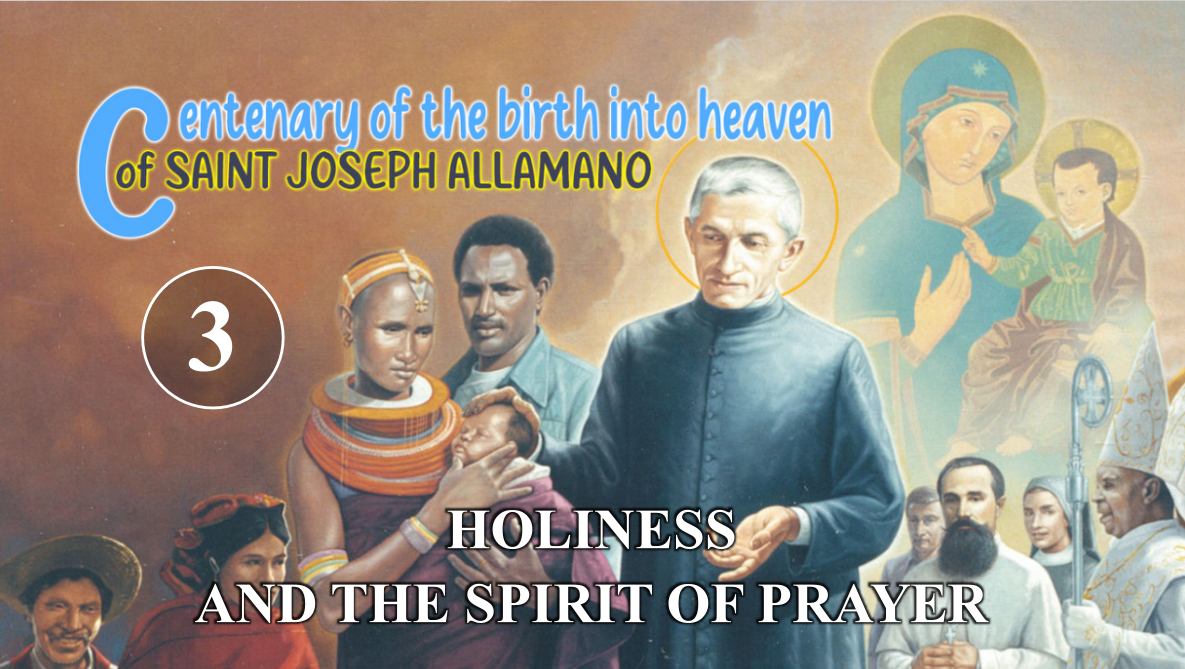Towards the Centenary of the birth into Heaven of Saint Joseph Allamano, a new reflection about Saint Joseph Allamano and the spirit of prayer
“One day, a young man went to look for work among the lumberjacks. The manager, after checking the young man’s physical appearance, immediately accepted and told him to come back the following day. On the first day of work, the young man cut down many trees. On the second day, the number of trees instead decreased, even though he put the same effort and dedication of the previous day. On the third day, the young man worked even harder, and yet he managed to cut just very few trees… The manager, after noticing such a steady drop in his performance, asked him when he had sharpened his axe last time. The young man confessed that he was taken up so much by his job that he forgot to sharpen his axe…”
Today’s world is so fast and hectic that it is very hard to stop to regain our strength and we run the risk of losing sight of the most important aspects of our missionary life. If we compare prayer to the axe of the lumberjack, then the story teaches us about the importance of keeping our prayer life always “very sharpened” to help us in everything we do in our life. Pope Francis himself reminds us that prayer can’t be just any prayer, because “prayer is like the oxygen of life, it serves to attract to us the presence of the Holy Spirit who always pushes us forward.”
Prayer, therefore, is the most important tool we have to get in touch with God, and to get familiar with Him, so much so that we can apply to ourselves the words of St. John:
“That which was from the beginning, that which we have heard, that which we have seen with our eyes, that which we have beheld and that which our hands have touched, that is, the Word of life…, whom we have seen and heard, we proclaim also to you” (1 Jn 1:1-3).
For St. Joseph Allamano prayer ia a priority:
“Yes, yes, work; but prayer is more necessary than anything else. First we must sanctify ourselves, first pray, then do good to others. We must love prayer! Blessed are you if you strive to progress more and more in the interior life, in a spirit of recollection and prayer.“
Yes, pray, pray well!
Allamano not only encourages us to pray a lot, but he also wants to teach us how to do it well! Such a teaching of his comes from his profound personal experience of encountering Jesus in prayer. It’s really singular how he describes the commitment we ought to have whenever we pray:
“We have to pray well, because praying badly is an insult to the Lord, so it’s better not to do it […] because it is disrespect for the Lord.
This does not mean that we should give up praying when we do not feel like … instead we should change our attitude so that our prayer turns out to be enriching and fruitful.
We are aware of so many different proposals and ways of spirituality that can inspire prayer life, but we know as well that St. Joseph Allamano has his own suggestions to help us pray well.
Before praying, we should prepare ourselves, by getting rid of any thought that can distract and disturb us.
“The presence of God prevents dissipation and keeps the practices of prayer interconnected, which otherwise would be like oases, outside of which everything is sterile.“
It is important, first of all, to focus on the words we pronounce as we pray so as to avoid praying in a hurry and then to reflect on the meaning of the words to nurture a preparatory inner attitude to our prayer.
It is necessary to be in tune with God and focused ourselves on Him:
“Think that I speak with the Lord; Do your prayers well, from the heart.”
To pray well, it is necessary to have a very mindful attitude: “In a position of respect, without worrying about anything else.” However, this does not mean that we must stop what we are doing to pray, because
“we can pray and work, as long as work allows us to think and that prayers are not strictly mandatory. Jesus also prayed while he worked in his workshop in Nazareth.”
Unfailing Prayer
In the book “The Spiritual Life of José Allamano”, we find very well outlined four conditions to make our prayers become unfailing and, at the same time, be reciprocated:
- Ask for everything necessary for the growth of our spiritual life: God does not give us stones for bread or snakes for fish.
- Pray with confidence that God will grant us what we ask for: “He who knows how to pray well, binds his hands to God and forces him to grant him what you ask. It takes so much trust that you can be a little bold, a little “authoritarian” and expect miracles. God is not offended by this.“
- Pray with humility: “Jesus, though he was God, prostrated himself on the ground in prayer. We must tell him, ‘Father, I deserve nothing, but I beg You to grant me the grace I so badly needed.'”
- Pray with perseverance: “We must never be discouraged if God does not answer our prayers immediately. We knock on the door; if no one opens the door, we knock harder and if this is not enough, we break down the door! It is Our Lord Himself who teaches us how to do this, in the parable of the man who went to disturb his friend during the night, until he got the bread he wanted.”
Prayer continues as a way to a spirit of prayer.
St. Joseph Allamano always spoke of the love for a continuous prayer, so that, on the one hand, we avoid falling into a superficial prayer and, on the other, we are helped to acquire a true spirit of prayer because ” prayer raises us to the presence of God and puts us in dialogue with Him“.
Continuous prayer is nothing else that the sign of the growth of our faith and the actual proof that we cannot live without God’s presence, and thus it spurs us to walk along the paths of holiness that God has prepared for each one of us. Why should we turn our lives in a continuous prayer? Because it is such an attitude of ongoing prayer that leads us to join Saint Paul in saying: I live, but it is no longer I, it is Christ who lives in me. I live my life present in the flesh, in faith in the Son of God, who loved me and gave himself for me (Gal 2:20).
There could certainly be more reflections about prayer as the fundamental pillar of Saint Joseph Allamano’s holiness, and also about our commitment to achieve and to live a true Spirit of Prayer. We hope that these few and simple reflections can mark the beginning of a inner personal journey to make prayer matter in our life based on the conviction that “we need to pray a lot, precisely, because we are missionaries“.
For personal reflection
- How do I see myself in the story of the lumberjack? What place does prayer occupy in my daily life?
- Does my prayer life go along with the indications given by Saint St. Joseph Allamano?
- What should I do more to make my life become a continuous prayer?









